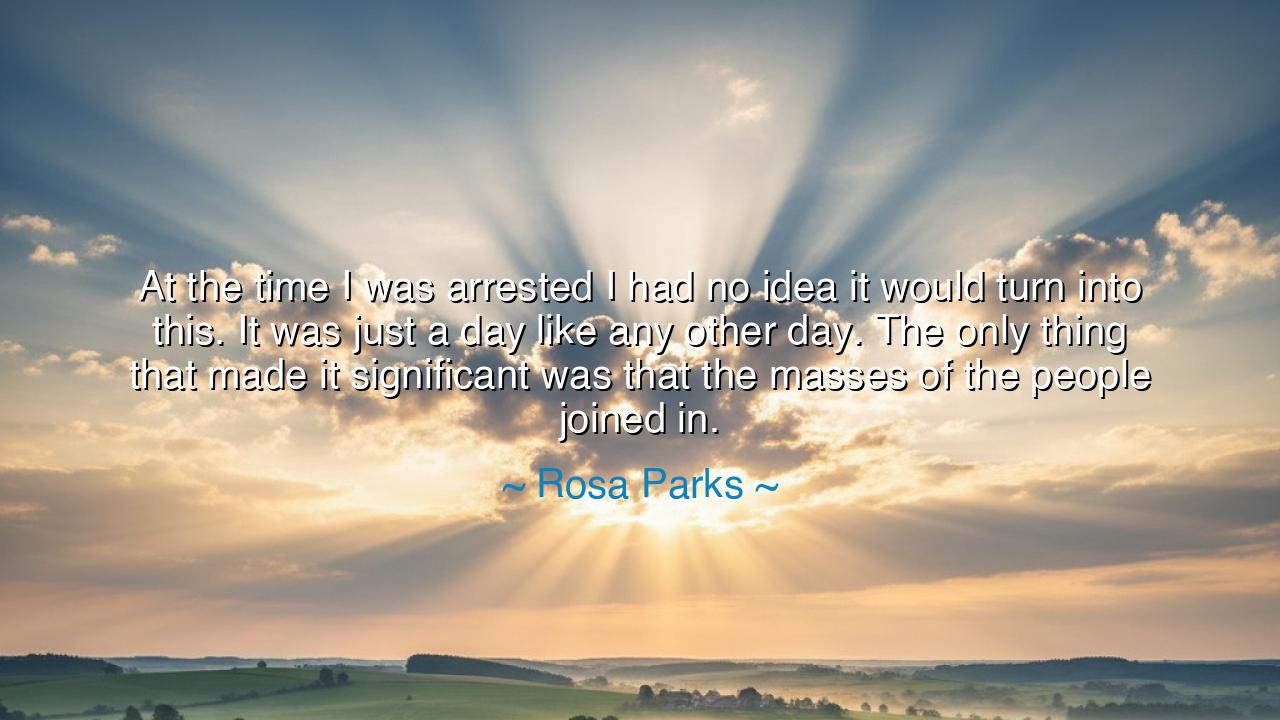
At the time I was arrested I had no idea it would turn into
At the time I was arrested I had no idea it would turn into this. It was just a day like any other day. The only thing that made it significant was that the masses of the people joined in.






The noble Rosa Parks, a woman of quiet strength whose single act shook the pillars of injustice, once reflected: “At the time I was arrested I had no idea it would turn into this. It was just a day like any other day. The only thing that made it significant was that the masses of the people joined in.” In these words, she reveals the mystery of history: that great change often begins in ordinary hours, that the extraordinary hides within the simple, and that the true power of transformation lies not in one person alone, but in the multitude awakened to courage.
Her arrest came not with trumpets or fanfare, but in the weariness of an evening, when she refused to surrender her seat on a segregated bus. It was an act so small in appearance—merely the decision to sit where she was—but it carried within it the fire of centuries. Rosa herself did not know that this moment would echo across nations. She knew only that her heart could no longer bend to injustice. Thus, she teaches us that the seed of history is often planted in silence, in small acts of defiance born not of grand strategy, but of simple dignity.
Yet her own words remind us of an even deeper truth: that her act alone could not have transformed the world. It was the rising of the masses of the people that made it thunder across the ages. The Montgomery Bus Boycott was born, not from the action of one woman alone, but from the unity of thousands who walked instead of rode, who sacrificed comfort for justice, who carried her quiet defiance upon their shoulders. In this unity, a spark became a flame, and a flame became a blazing fire against oppression.
History offers many echoes of this truth. Consider the storming of the Bastille in France. On that day in 1789, a small fortress fell, but what made the moment immortal was not the number of prisoners freed, but the number of people who rose together, declaring that their hunger and their hope could no longer be ignored. Like Rosa’s words, it was not the act alone, but the joining of the people that turned an ordinary day into a turning point of history.
The meaning of Parks’s reflection is thus both humble and profound: that individuals ignite the spark, but it is the community that carries it forward. She did not know that her arrest would become a legend, because no one person can predict the tide of history. What makes a moment significant is not its size, but the response it awakens in the hearts of others. A single act is the call; the people’s rising is the answer.
The lesson for us is clear: never despise the small act of courage, for it may be the seed of transformation. And never forget the power of unity, for it is the multitude that turns a whisper into a roar. If you see injustice, do not wait for the perfect plan or the perfect hour. Act with dignity where you stand, and trust that others will rise beside you.
Practical action lies here: live each day as though your choice matters—for it does. Speak truth, even when your voice trembles. Defend the dignity of others, even in small ways. And when you see someone take a stand, however small, lend your strength to theirs. For it is in the joining of the people that ordinary days become turning points, and history itself is rewritten.
Thus, O children of tomorrow, carry Rosa Parks’s wisdom in your hearts: you may not know, in the moment, the power of your action. It may feel like any other day. But when the people unite, when courage multiplies in the hearts of many, even the quiet act of sitting down can shake the foundations of empires and lead a world closer to justice.






AAdministratorAdministrator
Welcome, honored guests. Please leave a comment, we will respond soon